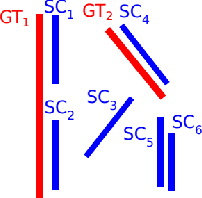Koen Ponse
Chargax: A JAX Accelerated EV Charging Simulator
Jul 02, 2025Abstract:Deep Reinforcement Learning can play a key role in addressing sustainable energy challenges. For instance, many grid systems are heavily congested, highlighting the urgent need to enhance operational efficiency. However, reinforcement learning approaches have traditionally been slow due to the high sample complexity and expensive simulation requirements. While recent works have effectively used GPUs to accelerate data generation by converting environments to JAX, these works have largely focussed on classical toy problems. This paper introduces Chargax, a JAX-based environment for realistic simulation of electric vehicle charging stations designed for accelerated training of RL agents. We validate our environment in a variety of scenarios based on real data, comparing reinforcement learning agents against baselines. Chargax delivers substantial computational performance improvements of over 100x-1000x over existing environments. Additionally, Chargax' modular architecture enables the representation of diverse real-world charging station configurations.
EconoJax: A Fast & Scalable Economic Simulation in Jax
Oct 29, 2024



Abstract:Accurate economic simulations often require many experimental runs, particularly when combined with reinforcement learning. Unfortunately, training reinforcement learning agents in multi-agent economic environments can be slow. This paper introduces EconoJax, a fast simulated economy, based on the AI economist. EconoJax, and its training pipeline, are completely written in JAX. This allows EconoJax to scale to large population sizes and perform large experiments, while keeping training times within minutes. Through experiments with populations of 100 agents, we show how real-world economic behavior emerges through training within 15 minutes, in contrast to previous work that required several days. To aid and inspire researchers to build more rich and dynamic economic simulations, we open-source EconoJax on Github at: https://github.com/ponseko/econojax.
Reinforcement Learning for Sustainable Energy: A Survey
Jul 26, 2024



Abstract:The transition to sustainable energy is a key challenge of our time, requiring modifications in the entire pipeline of energy production, storage, transmission, and consumption. At every stage, new sequential decision-making challenges emerge, ranging from the operation of wind farms to the management of electrical grids or the scheduling of electric vehicle charging stations. All such problems are well suited for reinforcement learning, the branch of machine learning that learns behavior from data. Therefore, numerous studies have explored the use of reinforcement learning for sustainable energy. This paper surveys this literature with the intention of bridging both the underlying research communities: energy and machine learning. After a brief introduction of both fields, we systematically list relevant sustainability challenges, how they can be modeled as a reinforcement learning problem, and what solution approaches currently exist in the literature. Afterwards, we zoom out and identify overarching reinforcement learning themes that appear throughout sustainability, such as multi-agent, offline, and safe reinforcement learning. Lastly, we also cover standardization of environments, which will be crucial for connecting both research fields, and highlight potential directions for future work. In summary, this survey provides an extensive overview of reinforcement learning methods for sustainable energy, which may play a vital role in the energy transition.
EduGym: An Environment Suite for Reinforcement Learning Education
Nov 17, 2023Abstract:Due to the empirical success of reinforcement learning, an increasing number of students study the subject. However, from our practical teaching experience, we see students entering the field (bachelor, master and early PhD) often struggle. On the one hand, textbooks and (online) lectures provide the fundamentals, but students find it hard to translate between equations and code. On the other hand, public codebases do provide practical examples, but the implemented algorithms tend to be complex, and the underlying test environments contain multiple reinforcement learning challenges at once. Although this is realistic from a research perspective, it often hinders educational conceptual understanding. To solve this issue we introduce EduGym, a set of educational reinforcement learning environments and associated interactive notebooks tailored for education. Each EduGym environment is specifically designed to illustrate a certain aspect/challenge of reinforcement learning (e.g., exploration, partial observability, stochasticity, etc.), while the associated interactive notebook explains the challenge and its possible solution approaches, connecting equations and code in a single document. An evaluation among RL students and researchers shows 86% of them think EduGym is a useful tool for reinforcement learning education. All notebooks are available from https://sites.google.com/view/edu-gym/home, while the full software package can be installed from https://github.com/RLG-Leiden/edugym.
Using Machine Learning to Detect Rotational Symmetries from Reflectional Symmetries in 2D Images
Jan 17, 2022



Abstract:Automated symmetry detection is still a difficult task in 2021. However, it has applications in computer vision, and it also plays an important part in understanding art. This paper focuses on aiding the latter by comparing different state-of-the-art automated symmetry detection algorithms. For one of such algorithms aimed at reflectional symmetries, we propose post-processing improvements to find localised symmetries in images, improve the selection of detected symmetries and identify another symmetry type (rotational). In order to detect rotational symmetries, we contribute a machine learning model which detects rotational symmetries based on provided reflection symmetry axis pairs. We demonstrate and analyze the performance of the extended algorithm to detect localised symmetries and the machine learning model to classify rotational symmetries.
 Add to Chrome
Add to Chrome Add to Firefox
Add to Firefox Add to Edge
Add to Edge